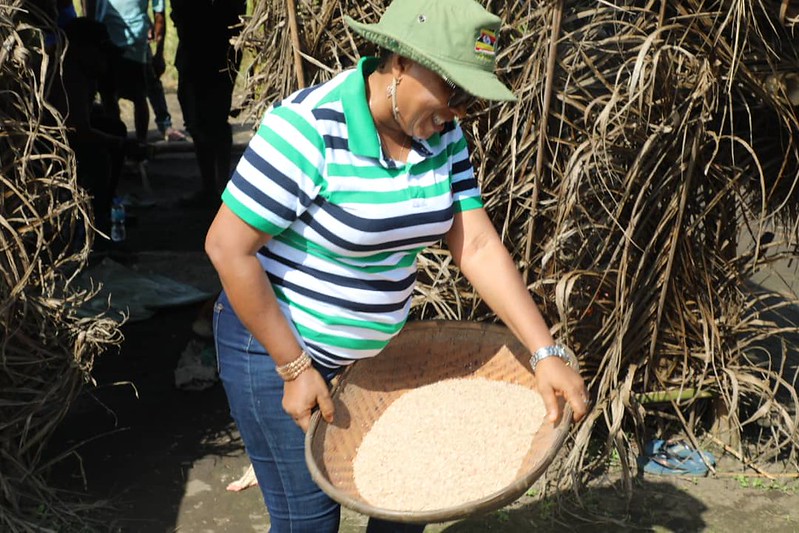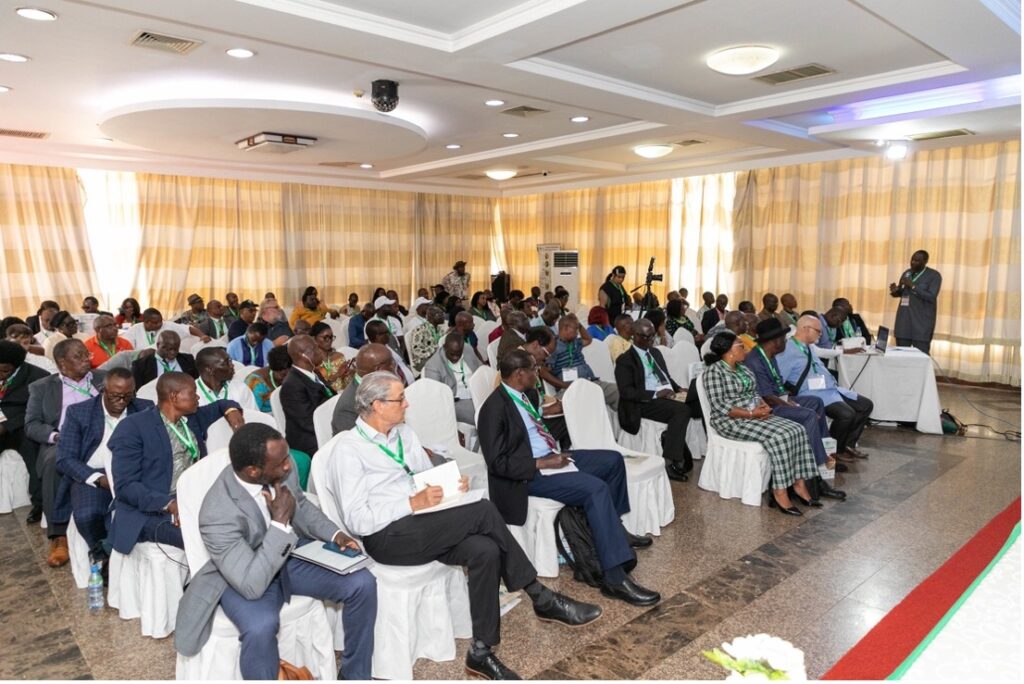
In the rural areas of Sierra Leone, more than 80% of the population relies on subsistence farming.
In 2021, the sector contributed approximately 57.4% of the country’s GDP and about 28% of its exports. Limitations to domestic production persist, particularly due to low access to quality seeds (8%), resulting fromthe weakness of the formal seed system.
The country’s main staple crop, rice, is currently produced at 1,978,905 tons, cultivated on 944,447 hectares of land with an average yield of 2.09 tons per hectare. Similarly, cassava production stands at 3,047,589 tons, cultivated on 155,727 hectares of land with a yield of 19.60 tons per hectare, and maize at 22,544 tons on 7,538 hectares of land with an average yield of 2.90 tons per hectare.

Feed Salone Imperatives
With sights set on boosting Sierra Leone’s agricultural productivity to fuel inclusive growth, increase local food production, reduce the country’s dependence on food imports, reduce hunger, increase export earnings, and create jobs while building a resilient food system, President Julius Maada Bio launched the Feed Salone Vision in October 2023.
“By increasing agricultural productivity and seeking food security and sovereignty, my government aims to reduce hunger and malnutrition, not just as a statistic on paper but as a visible transformation in the well-being of our children, families, and communities,” President Bio said.
“FEED SALONE is more than just a development Programme. It is a generational movement to propel Sierra Leone into an era of agricultural self-reliance, where every man, woman, and child is a witness to and a participant in a flourishing economy marked by food security, job creation, and overall economic prosperity,” he added.

Towards a Seed Roadmap
The push to translate the lofty objectives of the Feed Salone Framework into tangible reality across the country necessitated a seed roadmap.
Globally, agricultural transformation is driven by three key pillars: seeds, fertiliser and research products. For Sierra Leone to achieve an agricultural revolution, the country realised that it must develop a viable formal seed system while not neglecting the role of providing inputs and research.
Against this background, the Government of Sierra Leone, through the Ministry of Agriculture and Food Security under the leadership of Dr Henry Musa Kpaka and the Deputy Minister of MAFS, Hon. Theresa Dick, engaged key stakeholders from within and outside the country to elaborate a seed roadmap.
The African Development Bank, through its Technologies for African Agricultural Transformation (TAAT) programme; the International Institute of Tropical Agriculture (IITA) through its Building an Economically Sustainable Cassava Seed System, phase 2 (BASICS-II) project; the Sasakawa Africa Association, and Sahel Consulting responded to Sierra Leone’s call to revive the national seed industry as a first and foremost step entry to upscale cutting-edge technologies.
In collaboration with other stakeholders such as AfricaRice, the African Agricultural Technology Foundation (AATF), the Gates Foundation, the Alliance for Green Revolution in Africa (AGRA), Mennonite Economic Development Associates (MEDA), the Sierra Leone Agricultural Research Institute (SLARI), the Sierra Leone Seed Certification Agency (SLeSCA), the Office of the Presidential Initiative on Climate Change, Renewable Energy and Food Security, the Private Sector, and the National Federation of Farmers in Sierra Leone, the first Sierra Leone seed business summit was convened in Freetown from the 18 – 20 September 2024
The three-day seed summit catalysed the realisation of the Sierra Leonean Government’s agricultural policy goals through seed sector development, raising awareness on the role of quality seed in agricultural transformation, and charting the path for the seed sector. development.
A development, experts say, must be guided by a seed roadmap that will boost the supply of quality seeds of climate-resilient and market-preferred varieties to respond to the growing needs for food and industry in Sierra Leone and advocate for more investments in sustainable cassava, maize, soybean and rice seed systems for economic prosperity, including job creation and access to affordable foods.
A seed roadmap, which emerged as an outcome of the intensive summit, is a strategic document that outlines the seed gap, quantifies demand and supply, and contextualises the investment needed in the seed sector to achieve food security in Sierra Leone.
The roadmap identified constraints to farmers’ access to quality, certified seeds of the major staple crops (rice, maize, soybeans, and cassava) and developed solutions (policy, institutional, technical, infrastructural, market, and budgetary) to address them.
The Sierra Leone seed roadmap builds on the successes of the BASICS-II project in Nigeria and Tanzania, as well as the AfDB-funded Technologies for African Agricultural Transformation (TAAT) programme. For instance, the BASICS-II model has shown that improved and certified cassava stems yield 81% more than non-certified seeds.

In its model, BASICS-II considers the seed system a holistic ecosystem. It seamlessly connects the dots across the breeding pipeline to early-generation seed producers, foundation seed producers, and commercial seed entrepreneurs. This model is being replicated in the Sierra Leone seed roadmap framework to promote shared prosperity among farmers.
Partnership for a Sustainable Seed Roadmap
The elaboration of the seed roadmap has yielded positive investment, with approximately USD67 million pledged for its implementation. This marks a crucial step toward increasing production and productivity.
According to Dr Isata Kamanda, the Deputy Director General for Commercialisation and Agribusiness Development at SLARI, “Within a year, the Sierra Leone Actionable Seed Roadmap has yielded positive investment dividends as Development Partners led by the World Bank, Islamic Development Bank (IsDB), AfDB, and the Korea-Africa Food & Agriculture Cooperation Initiative (KAFACI), who have all made funding pledges to support the implementation of the sustainable seed roadmap.”
“This will provide a unique opportunity to build a sustainable seed system that will empower our value chain actors, enhance our food security, and promote sustainable economic growth in Sierra Leone,” Dr Kamanda added.
With strong political leadership, the seven-year seed roadmap is poised to birth a sustainable seed industry.
Thus, it will ensure a significant increase in the production and supply of adequate quantities of quality-certified seeds to Sierra Leonean farmers, with the goal of achieving the Presidential flagship programme, Feed Salone Vision.
The seed roadmap, along with the complementary technologies and innovations that the partners bring to Sierra Leone, can triple the present productivity levels to achieve the objective of the government’s flagship programme.
The success of the stakeholder consultative process in developing the actionable document demonstrates the power of political leadership and global partnership in supporting agricultural transformation in Africa.











